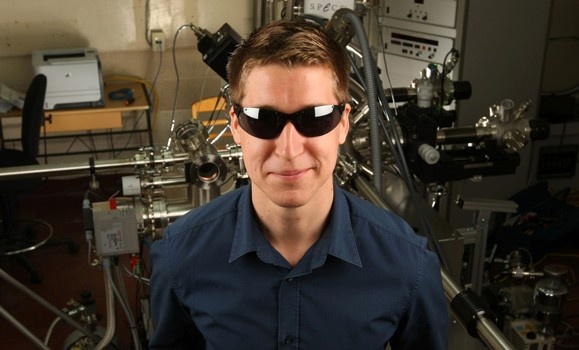This summer has been a homecoming in more than one sense for Doug Staple.
The Dartmouth native, who did his BSc and master’s degrees in physics at HÂţ», has recently returned to Canada after completing his PhD in Germany to take up a prestigious Killam Post-Doctoral Fellowship with the Department of Physics and Atmospheric Science. The Killam is a prestigious award only given to three post-doctoral fellows at HÂţ» per year.
Describing himself as “extremely happy” to have received the fellowship, Dr. Staple will be researching more efficient ways to build solar cell panels.
He didn’t initially see renewable energy as a career path; up until two summers ago, he mostly studied biological physics. But after attending a summer institute in computational chemistry and materials science in California, as well as a meeting of Nobel Laureates in Germany, he became interested in the subject.
“It seemed to me that everyone at that meeting was wondering how to supply the world with clean, abundant energy,” he says, explaining that it’s an opportunity to get involved in something “people can understand and relate to” and also offers huge potential to improve both the economy and the environment.
Changing directions
But pursuing this path necessitated a change in his field of study – a daunting prospect after spending most of his academic career doing something else.
Fortunately, Dr. Staple is not afraid of a challenge. He finished his master’s degree in one year, his PhD in three and a half, and even began working on a second MSc in mathematics while working on his PhD. “I found I was the most productive and happy if I had several different things to think about,” he explains.
Dr. Staple also has a long list of awards to his name, including the University Medal in Physics for his BSc, the Governor General’s Gold Medal for his master’s, three NSERC awards (one for each level of study), a Killam Predoctoral Scholarship, and now a Killam Postdoctoral Fellowship. Â
So once he knew that he wanted to switch fields, HÂţ» became the obvious choice for his postdoc. “The world-class expertise necessary to stage the research was here,” he explains, “and I would be able to get the support that I needed from people that I trusted in order to make it work.”
Advice to future scientists
While he isn’t sure yet where his career will take him in the future, he advises fellow scientists starting out in academia to remember that there is more to life than science, and that balance is important. His time in Germany, for instance, sparked an interest in politics.
“When I was 18 I thought physics was the only interesting subject in school and everything else was trivial,” he says. “I learned the hard way that there are interesting things all over the place.”
And he has words of wisdom for other graduate students. “Life as a scientist is not rosy,” he warns. “Expect to move a lot.”
He also advises students to start thinking about careers outside of academia from the beginning, saying that being single-minded about working in a university can lead to disappointment down the road. “You need to think of several appropriate career choices and make sure you are taking steps to move into any of those careers.”
Dr. Staple doesn’t know whether he’ll end up in academia, but he is satisfied with his experience so far and credits his experiences at Dal, particularly his time working on his master’s degree with Jürgen Kreuzer, with giving him the necessary training to succeed.
“[Doing my master’s here] was the best return on investment of anything I’ve done in my career,” he says.
“HÂţ» has been a constant part of my development as a scientist during the past nine years, and I am very happy to be working here again full-time.”

